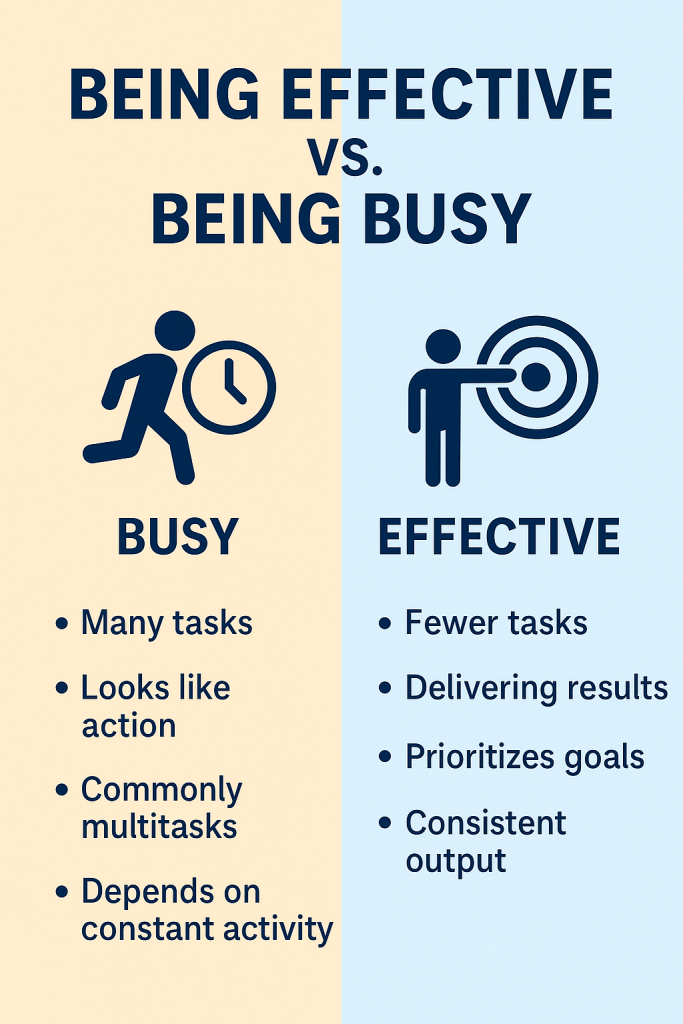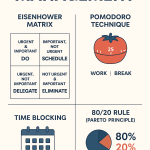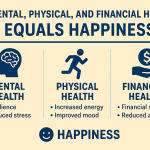Introduction: Being Effective vs. Being Busy
In today’s world, where hustle culture glorifies long hours, many people confuse busyness with productivity. But here’s the truth: being busy isn’t the same as being effective. Being effective vs. being busy is a mindset shift that separates high achievers from those spinning their wheels. If your calendar is packed but you feel like you’re not moving forward, this article is for you.
The focus keyword here—being effective vs. being busy—reminds us that real success doesn’t come from how much you do but from doing the right things. Studies show that people who prioritize high-impact tasks achieve better results with less stress (Harvard Business Review, 2021). Let’s explore how you can stop being “busy” and start being truly effective.
What Does It Mean to Be Busy vs. Effective?
Defining Busyness
Being busy often means working long hours, constantly reacting to tasks, or juggling multiple things at once. It creates the illusion of productivity without necessarily delivering meaningful results. Think of a hamster running on a wheel—lots of motion but little progress.
Defining Effectiveness
Effectiveness, on the other hand, means doing the right things—the tasks that drive progress toward your goals. Peter Drucker, the father of modern management, famously said, “Efficiency is doing things right; effectiveness is doing the right things.”
A Real-Life Example
Imagine two employees:
- Busy Ben spends 10 hours replying to every email instantly, attending every meeting, and checking off small tasks.
- Effective Emma spends 6 hours focusing on key projects, delegating low-value tasks, and saying “no” to distractions.
At the end of the week, Emma makes measurable progress, while Ben wonders where all his time went.
Why We Confuse Busy with Effective
The Culture of Hustle
Social media glorifies working late, multitasking, and having a packed schedule. It feeds the myth that busyness equals success.
Dopamine from Tasks
Checking small tasks off a to-do list feels good. Studies in Organizational Behavior and Human Decision Processes (2010) show that people prefer completing easy tasks quickly for instant gratification, even if those tasks have little impact.
Fear of Missing Out (FOMO)
Many professionals say yes to every meeting, email, or request out of fear of being left behind. This leads to overcommitment and scattered focus.
The Hidden Costs of Being Busy
Burnout and Stress
Constant busyness increases cortisol levels, leading to burnout, anxiety, and even health issues. The World Health Organization officially classified burnout as an occupational phenomenon in 2019, highlighting its growing impact.
Lack of Progress
Busyness creates the illusion of forward motion, but without focus on priorities, you remain stuck. Think of paddling furiously in circles instead of moving toward shore.
Opportunity Cost
Every minute spent on unimportant tasks is time stolen from high-value work, personal growth, or rest.
The Science of Effectiveness
The Pareto Principle (80/20 Rule)
The Pareto Principle suggests that 80% of results come from 20% of efforts. By identifying those high-impact tasks, you can focus your energy where it counts.
Deep Work vs. Shallow Work
Cal Newport, in his book Deep Work, distinguishes between high-value, focused work and low-value “shallow” tasks. True effectiveness comes from deep, undistracted focus.
Energy Management
Studies in the Journal of Applied Psychology (2019) show that managing energy—not just time—is key to effectiveness. Rest, exercise, and mindfulness fuel productivity more than long hours.
Signs You’re Busy, Not Effective
- You spend most of your day in meetings or answering emails.
- Your to-do list has 20+ items, but none of them align with big goals.
- You feel exhausted but can’t point to meaningful progress.
- You multitask constantly but complete little.
Strategies to Shift from Busy to Effective
Set Clear Priorities
Identify your top three tasks each day. Ask: If I only finished these today, would I still feel productive?
Apply the Eisenhower Matrix
Categorize tasks into:
- Urgent & Important (do now)
- Important, Not Urgent (schedule)
- Urgent, Not Important (delegate)
- Not Urgent, Not Important (eliminate)
This helps you focus on effectiveness, not busyness.
Say “No” More Often
Warren Buffett once said, “The difference between successful people and very successful people is that very successful people say ‘no’ to almost everything.”
Use Time Blocking
Dedicate chunks of time to meaningful work, and don’t let shallow tasks creep in.
Embrace the Pomodoro Technique
Work in focused intervals (25–50 minutes) with short breaks. This reduces fatigue and boosts concentration.
Tools to Help You Stay Effective
Digital Tools
- Notion – for project tracking.
- RescueTime – to track where your time goes.
- Todoist – to prioritize tasks.
- Google Calendar – for time blocking.
Analog Tools
A simple planner or bullet journal can help you stay intentional and avoid digital overload.
Being Effective in Different Areas of Life
At Work
Focus on big-picture projects, delegate where possible, and limit unnecessary meetings.
In Relationships
Being effective means prioritizing quality time over constant availability. For deeper insights, explore our Relationships Category.
For Students
Replace all-nighters and frantic studying with structured, spaced-out learning.
For Entrepreneurs
Effectiveness means focusing on strategy, innovation, and delegation instead of micromanaging everything.
Case Studies: Effectiveness in Action
Steve Jobs
Jobs was known for relentless focus—saying “no” to thousands of ideas to focus on a few that mattered.
Elon Musk
Schedules his day in 5-minute blocks, forcing himself to prioritize effectiveness over busyness.
Students Who Prioritize
Research in Educational Psychology Review (2020) shows that students who study in focused, planned sessions outperform those who cram while multitasking.
The Mindset Shift from Busy to Effective
Focus on Outcomes, Not Activities
Ask yourself: What did I achieve today? instead of What did I do today?
Quality over Quantity
One hour of deep focus often outperforms an entire day of scattered busyness.
Redefine Success
Stop glorifying long hours. Success should mean progress toward meaningful goals, not filling every minute.
Common Misconceptions
“Busy People Work Harder”
Hard work is valuable, but without focus, it’s wasted effort.
“Multitasking Saves Time”
Research shows multitasking reduces efficiency by up to 40% (American Psychological Association, 2022).
“Effectiveness Means Laziness”
Being effective isn’t about doing less—it’s about doing better.
Final Thoughts: Choose Effectiveness Over Busyness
Busyness is addictive, but effectiveness is transformative. When you prioritize meaningful tasks, manage your energy, and focus on outcomes, you’ll achieve more in less time—without burning out.
So, the next time you feel overwhelmed, ask yourself: Am I being effective, or just busy? The answer may change not just your workday but your life.
Call to Action
Ready to break free from the trap of busyness and focus on effectiveness? Start today by identifying your top three priorities and eliminating one task that doesn’t move you forward. For more practical strategies, check out this in-depth resource on The Ultimate Guide on Time Management and explore how financial and lifestyle choices impact productivity in our Frugality and Personal Finance guide.



